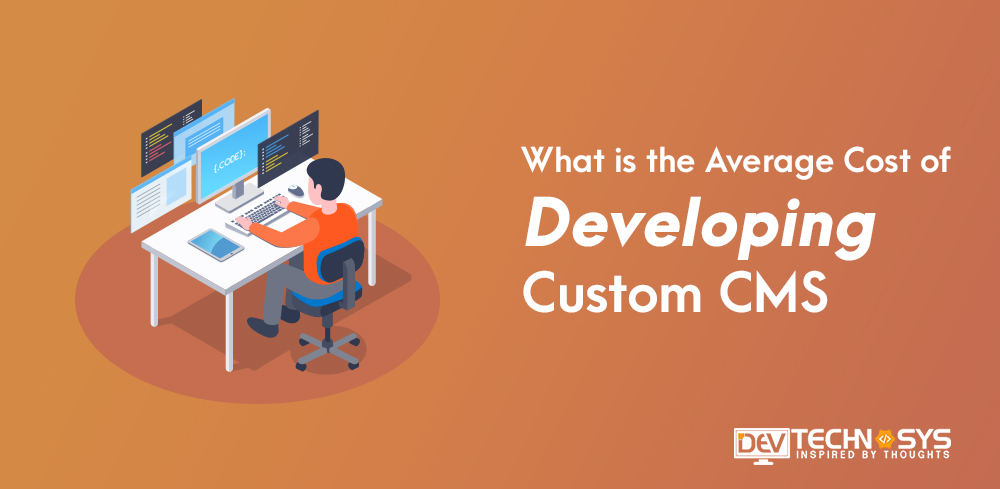Over the years, content management systems or CMSs have become an essential part of businesses. However, one of the things which most CMS development services encounter is the lack of understanding and foresight among the clients about what a CMS actually is and what is the actual costs of implementing a CMS. However, it is pretty understandable since it is quite an advanced technology in a particular area that hasn’t been explored and understood by most of the businesses in the first place.
Table of Contents
Table of Content
1. Introduction
2. How to Choose CMS
3. Configuration of a CMS
4. Training CMS Support Staff
5. Consistent Maintenance
6. Cost of a CMS
7. Conclusion
Also, there are different issues which need to be considered whenever selecting to implement a CMS, especially which particular system to use, keeping a staff whose only job is to keep the website updated as well as supporting that staff with the proper training which is involved in learning how the CMS actually works. It also includes selecting the right CMS development company to implement and maintain your own CMS. So, let’s discuss what the costs associated with the development of custom CMS along with its average cost are.
How to Choose CMS
Now, when you have to choose a CMS, the things which you have to look at are the myriads of capabilities of the CMS and finding out whether it is perfectly appropriate for your business’s existing and future requirements and whether you can easily find a CMS development company to configure a CMS for you easily.
If you are wondering whether you will need a vendor or not, then, of course, you require one who can set up and configure the system to start easily. CMSs are often designed to easily make updating of the entire content manageable by your own staff, but it isn’t a cakewalk. Whenever you install a custom CMS, every platform makes few assumptions about what you will actually be using it for.
Few platforms have their own pre-built “profiles” for different use cases, but it is quite sure that most of the businesses will have requirements that don’t mesh with the actual default setup of the CMS. The thing that you need earlier in the process is someone who is quite familiar with the entire capabilities of the system in order to help map your current content structure to how the present CMS actually “perceives” about the content and to ensure that your entire content strategy is certainly making best utilization of the tools which are available via the CMS.
Related Blog: Complete Guide On CMS: Present, Publish & Edit Content
Configuration of a CMS
Obtaining the right CMS is just the first step of the entire process. After you have created the website, you have to duly understand the characteristics of the entire content you actually manage and then translate that to a particular configuration which the CMS understands as well as can work with.
For instance, if you choose from web development solutions like a WordPress site for a business, and then you wish to showcase a wide range of products along with demonstrations regarding the materials that business work with as well as particular feature brands, then you need to know how to configure CMS to leverage its capabilities. You can set up a much more robust and intuitive configuration which can make each content type pretty unique, also tailoring the input to the particular content type, and this, in turn, made updating the entire site much more intuitive.
Training CMS Support Staff
Only because you can easily update the website doesn’t mean you can maintain the entire CMS. There are numerous small business owners who have a certain tendency to think that they can easily do all by themselves, and they do perform such things which works out quite a lot of time. However, your web presence isn’t one of the places where you should be actually doing all by yourself.
Even though a customer creates good content, he or she might not be great at writing that type of content that is required on a website. Hence, having a content strategy is quite an important step to what to actually put on the website. Also, if you jump right in without actually learning the entire system, you will most probably face trouble with things such as posting images in the right size and scale, proper text formatting, properly organizing the pages with the overall site’s context. So, having someone who is well-versed with the know-how of how to do these things certainly make your life a whole lot easier and makes your website much more appealing.
Consistent Maintenance
Content management systems are complex software. The most popular ones are often the targets of hackers because one particular hacker can easily write one script which targets millions of different websites. But this shouldn’t change your decision to have a popular CMS as long as any of the full stack web development services from where you have taken the CMS, know how to secure it easily, and you should be willing to invest some resources to keep it updated and patched.
It means that along with the one-time expense of setting up your own CMS, there will certainly be ongoing costs to both patches as well as upgrade it. Also, depending on the nature of the entire project, you may require to keep the core code along with one or two extra modules or plugins updates.
Cost of a CMS
There are three major open-source CMSs that are quite good and have large communities that support them, which are, Joomla, WordPress, and Drupal. Unless you are going for custom CMS from CMS development services, one of these three systems will certainly work well for your own website. However, it comes down to your choice of going for open source versus propriety software or custom CMS. Whenever people consider going for open source software, they think of it has a free one.
However, in the case of proprietary software, it can cost around a few hundreds of dollars. But some companies choose for custom CMS. The average cost of these software ranges from $10,000 to $50,000 for the overall package, which includes design, development of custom features, configuration, and so on. You can add a couple of thousands of dollars for training your support staff.
Conclusion
Ever since the dawn of the internet, websites have become the face of businesses. However, managing the content of the website can be quite a tedious task. Here, content management systems ease the process and help the businesses to maintain the content according to a content strategy easily. There are various CMSs available in the market. CMS development companies provide custom CMS along with proprietary CMS for the businesses. Then there are open-source CMS such as WordPress, Joomla, and Drupal.
However, choosing a custom CMS is considered to be the best choice, as supported by the points mentioned above. Also, the cost of development of custom CMS depends on configuration, design, custom features that the business wants along with the training of the support staff. A rough estimate of the average cost of developing a custom CMS has been duly explained above. As a business, choose the CMS which suits your requirements, whether an open-source CMS, a proprietary CMS or last but not the least, a custom CMS.
























